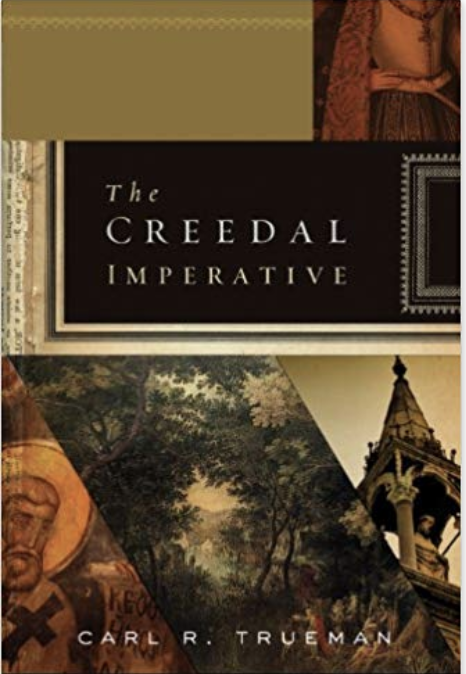The Creedal Imperative
My motivation for choosing to read and review Carl Trueman’s The Creedal Imperative, was more than a bit self-serving. Starting this March, I’ll be teaching an adult Sunday School class about creeds and confessions.

So, it seemed helpful and wise, as well as a real win-win situation, to have Trueman’s book serve the dual purpose of preparing me for teaching while also facilitating my book review. I’m confident you will find The Creedal Imperative instructive in helping you appreciate and understand the role of creeds and confessions in the believer’s life.
Trueman’s stated goal for The Creedal Imperative is to make the case that creeds and confessions are necessary for the “well-being of the church, and that churches that claim not to have them place themselves at a permanent disadvantage when it comes to holding fast to that form of sound words which was so precious to the aging Paul as he advised his young protégé, Timothy.” In fact, Trueman goes to significant and very compelling lengths to dispel the notion of, “No Creed but the Bible.”
Even as I type, “No Creed but the Bible,” I can’t help but feel drawn to the principle. There is nothing above and/or on par with Scripture. However, confessional Christians, such as Trueman, are not suggesting creeds and confessions are above and/or on par with Scripture.
The creeds and confessions that have been supported and promoted over the millennia are entirely dependent upon the Bible. The Apostle’s Creed, penned in the 4th Century, is a basic statement of belief by early Christians, not an attempt to usurp the authority of the Bible.
On Omaha Bible Church’s website, there’s a link to the London Baptist Confession of 1689 along with the following qualifying statement, “As a church that recognizes and values the work of God throughout history, OBC is in essential agreement with earlier Christian creeds and confessions. The particular historic confession that best expresses our theological commitment is the London Baptist Confession of 1689.”
Cited in the very first article of the confession, which addresses The Holy Scriptures, paragraph 10 states, “The supreme judge for deciding all religious controversies and for evaluating all decrees of councils, opinions of ancient writers, human teachings, and individual interpretations, and in whose judgment we are to rest, is nothing but the Holy Scripture delivered by the Spirit. In this Scripture our faith finds its final word.” Simply stated, Scripture is rightly supreme.
Trueman wisely states that the Christian who claims he (or she) has no creed but the Bible, does in fact have a creed – and a confession; just not in writing. Therefore, that person (or church) is not subject to critique and scrutiny.
Creeds and confessions summarize and express the primary elements of the Christian faith. Accordingly, as soon as a person or church begins verbalizing what the Bible teaches, they are expressing a creed and/or confession.
Trueman’s book highlights the potential and real benefits of creeds and confessions. One’s ability to express and summarize the basic elements of the Christian faith is a likely source for fueling believers’ worship of Christ and His Word.
Creeds and confessions fuel worship for Christ and are a definitive means by which we can state what we do (and don’t) believe to be true about Christ and the Scriptures. Sounds like a win for all of us.
More in Monthly Newsletter
May 1, 2024
The Christian Ethic of Joy and SufferingMay 1, 2024
Elders ReportMay 1, 2024
Deacons Report